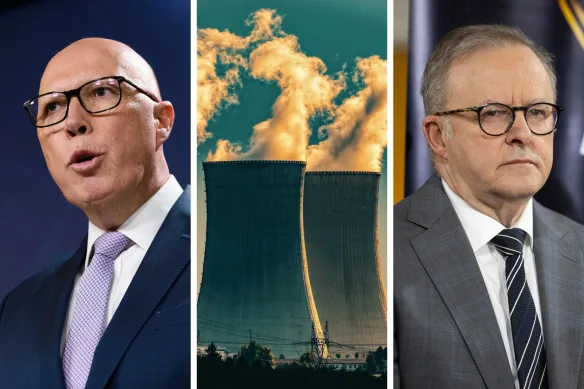The Labor Party has launched a scathing attack on nuclear energy, warning of an increased risk of cancer, heart attacks, and strokes.
But is this just a scare campaign, or are there genuine concerns to be addressed? We delve into the controversy surrounding nuclear power in Australia.
The Alarmist Claims
In a video posted on social media, Dr Margaret Beavis, a Melbourne GP, alleged that nuclear energy is a health hazard. “From a health perspective, nuclear makes no sense,” she claimed. Dr Beavis pointed to studies suggesting a link between radiation exposure and an increased risk of cancer, heart attacks, and strokes. She also highlighted the example of childhood leukemia, which she said had more than doubled in areas near nuclear power plants.
A “Load of Codswallop”?
However, the Opposition was quick to dismiss these claims as “a load of codswallop.” Nationals MP Keith Pitt questioned why Labor was allowing Australian sailors to train on nuclear-powered vessels if the risks were so great. He also pointed to the Lucas Heights nuclear reactor in Sydney, which has been operating safely for over five decades and produces vital nuclear isotopes for medical use.
The Politics of Nuclear Power
At the heart of this debate is a fundamental disagreement over Australia’s energy future. The Opposition, led by Peter Dutton, is championing nuclear power as a zero-emissions solution to our energy needs. They claim that their approach, which combines nuclear energy with renewables and gas, will be more than $250 billion cheaper than the Albanese Government’s proposals.
Unpacking the Science
So, what are the facts behind the fears? While it’s true that radiation exposure can increase the risk of certain health problems, the science is not always clear-cut. Nuclear power plants do emit low levels of radiation, but the risks are typically considered to be small. Moreover, modern reactor designs incorporate multiple safety features to minimize the risk of accidents.
The Medical Perspective
Dr Beavis’s warnings are based on her role with the Medical Association for the Prevention of War, an organization that highlights the devastating consequences of nuclear war. While this is a legitimate concern, it’s essential to separate the risks of nuclear war from the risks associated with nuclear power generation.
Conclusion: A Balanced Approach?
As the nuclear energy debate rages on, it’s crucial to separate fact from fiction. While there are genuine concerns to be addressed, it’s also important to consider the potential benefits of nuclear power in reducing our reliance on fossil fuels. Perhaps the answer lies in a balanced approach, one that acknowledges the risks while also exploring the opportunities that nuclear energy can offer. One thing is certain – the Australian public deserves a more nuanced and informed discussion about our energy future.

